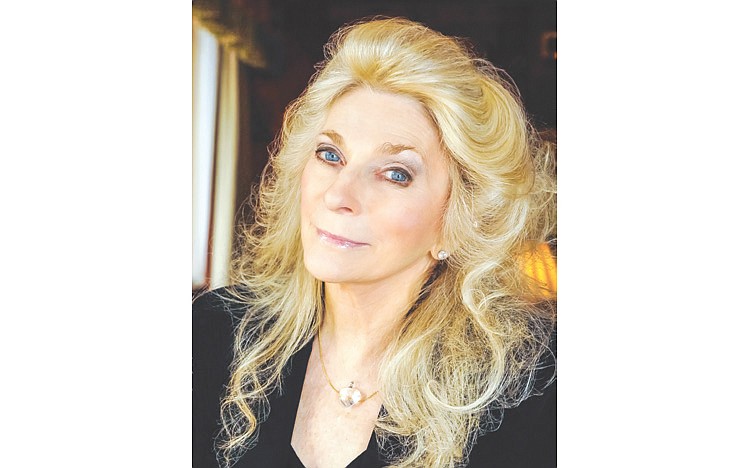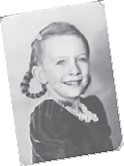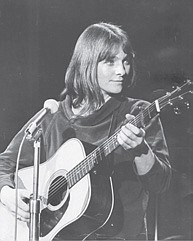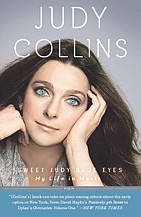Seattle Native Judy Collins
January 2, 2014 at 12:57 p.m.
“I was born on May 1, 1939, in Seattle, Washington, the land of crisp apples and rainy days…” writes Judy Collins in her first autobiography, Trust Your Heart (1987).
She was named Judith, but her father usually called her Brighteyes. She has called her father, a famed showman in Seattle and Colorado, “my greatest inspiration.”
Although blind, he was so self-sufficient that many he encountered didn’t realize it at first. “He was very musical, very dramatic, very handsome, articulate, well read – he read everything in Braille. We loved to brag that our father could read in the dark. We were raised on great literature and great music and we had a very liberal education.”
In Trust Your Heart, she writes of some of her earliest memories of her father and her life in Seattle:
“His sweet and mellifluous voice pervades the house as he sings, slipping into a freshly laundered white shirt and fixing his tie in a Windsor knot. He is warming up for his radio show, trying out new melodies. ‘I’ll take you home again, Kathleen, to where your heart has always been,’ he sings, and I sing harmony with him, following the course of the melody, shadowing the song with another note that makes a chill of pleasure run up my spine.
“ ‘This tyke can harmonize with anything, even a car horn, a train whistle’ he would say. He was always proud of the way I learned songs without struggling. I sang with the radio, I sang to put myself to sleep, I sang for anyone who would listen.”
The Collins household was always filled with music. “I was born into this wonderful musical family,” says Collins. “I experienced my first feelings of joy and power and pleasure in singing…”
Judy Collins vividly recalls a trip in 1942 when she was three. She writes: “Daddy packed me and Mother into ‘Claudia,’ our slope-backed, shiny black Buick, and toured the West, performing concerts for a company called the National School Assemblies…My father, singing in his Irish-tenor voice, performed the songs of Rodgers and Hart, Irving Berlin, Cole Porter. His program was a mixture of humor and philosophy, which he called his ‘medicine show.’ I would stare from the wings of auditoriums, in my mother’s arms or by her side, and sing along with the music. Then Daddy would call me out onto the stage, saying, ‘Here’s my little girl, Judy.’ I would rush into his arms. I loved the stage, the lights, the faces of the people in the audience and the thought that I was making them happy, just by being there. My father said I was a born ham.”
Her many happy memories of Seattle include her grandparents’ house (where decades later she would attend their 75th wedding anniversary). “They had a forest of flowers and fruit trees and chickens running around the backyard,” she recalls with a laugh. “I remember the cherries and canning and parties with relatives who came from near and far.”
After her brother was born in 1943, her father took a job at NBC in Hollywood. “We left the house on Twenty-seventh Street in Seattle and moved down to California…I missed the green of Seattle.” The Collins family later moved to Colorado.
The following article, which picks up Judy Collins' life after she moved to Colorado, appeared in 'Irish America' in June 2013. It was written by Patricia Harty, publisher-in-chief of 'Irish America.'
El Troubadour
...by Patricia Harty
Judy Collins, one of the most influential folk singers of the sixties, and the voice that has been called the voice of the century, still believes that music can heal the world.
It all began with a song.
As a young 14-year-old, Judy Collins heard The Gypsy Rover on the radio and it changed the course of her life. She was studying classical piano and had already made her orchestral debut, but the ballad, a tale of a girl who runs off with a dashing stranger, won her heart. She persuaded her father to get her a guitar, broke her piano teacher’s heart, and began the musical journey that would take her out of Colorado and put her on the road to being recognized as one of the greatest singers of our time.
Collins made her first album in 1961, at age 22, won a Grammy Award in 1968 for Both Sides Now, made the cover of Life in 1969, and today, more than 40 albums later, at least six of them Gold, she is still recording and playing concerts – up to 100 a year.
Collins has lived in the same New York City upper west side apartment for over 40 years. She shares the space with her husband, Louis Nelson, the artist known for the Korean War memorial in Washington, D.C., whom she met in 1978, and their three cats, Coco, Tom Wolfe, and Rachmaninoff.
The apartment reflects the artistic nature of the occupants: a grand piano in the living room, walls filled with art work, including paintings by Judy’s sister Holly, family photos, Tiffany lamps, Buddhas… and a recording studio. For a number of years now, Collins had been recording her own albums, and a handful of other artists.
Collins is physically lithe and carries herself with the grace of a dancer. She is unhurried, though she’s packing a full schedule. Her body, toned from daily exercise, and her clear skin belie the illnesses of her youth – polio when she was 10, TB in her early 20s, hepatitis and mono, spinal and leg injuries from a fall, and later struggles with an eating disorder, and addictions to alcohol and cigarettes.
The five Collins children, two girls and three boys, were brought up knowing that much was expected of them.
At 19, Judy married Peter Taylor and gave birth to their son, Clark. To support the family while her husband was in college, Collins sang in bars around Denver. After his graduation, the young couple moved east, where Peter taught English literature at the University of Connecticut, and Judy became popular on the college radio station. But the folk scene was taking off in Greenwich Village in New York City, and this is where Judy was drawn, as were other artists of the day. Judy would meet them all, and record many of their songs – Bob Dylan, Leonard Cohen, and Joni Mitchell whose song Both Sides Now proved a breakthrough hit for Collins, earning her a Grammy Award in 1968.
As her career was taking off, Collins’ marriage was breaking down. While she was plying her trade and learning her craft she was missing out on her son’s early life. And in the spring of 1962, she met Walter Raim, a guitar player who would be the catalyst for the breakup of her marriage. The affair didn’t last but the ramifications did – divorce and a custody battle for her son, which she lost. It would be several years before she would have custody of Clark again
Throughout her life, no matter what was happening to her personally, Collins was, and is, a committed social activist. In the 60s and 70s she supported civil rights, and women’s rights, and she traveled to the South to register black voters.
With the 1966 album In My Life, Collins moved away from straightforward folk music, and has remained untethered to one genre of music. She has a knack of finding a good song and breathing life into it. Her 1968 recording of Amazing Grace brought the 18th-century hymn back into the present day (it was top of the charts both in the U.K. and U.S.), and it has remained part of our cultural consciousness. Stephen Sondheim’s Send In the Clowns was also a huge hit. She appeared with the Boston Pops Orchestra and on the Muppet Show, and made many appearances on Sesame Street. She even took a turn on the New York stage, appearing with Stacy Keach (whom she lived with for a time) in the 1969 revival of Peer Gynt.
Collins also produced and codirected an award-winning documentary on her former piano coach Antonia Brico (1974). And she has written several books based on her life, in which she tackles difficult issues such as the suicide of her son Clark in 1992, and her own battle with alcoholism. Her books include Sanity and Grace: A Journey of Suicide Survival and Strength (2006), and Sweet Judy Blue Eyes: My Life in Music (2011). The latter title comes from the song written about her by Stephen Stills, of Crosby, Stills and Nash. (The two met in 1968 and had a two-year passionate affair.)
Today, Collins continues to pursue her creative passions. She created her own label, Wildflower Records, in 2000 to record her own music and support the work of other artists. She writes songs and books and continues to perform.
When we met at her apartment in late April, she had recently had a guest spot on the TV series Girls (she said it gave her street cred with her nieces and nephews) and was preparing for a June 8 concert at the Town Hall, New York. She was also planning a trip to the U.K. and Ireland to record a concert for PBS, and to be inducted into the Irish America Hall of Fame.
In the interview, Collins discusses some of the more difficult aspects of her life:
On alcoholism and depression: “There’s definitely a genetic component and it has to do with things that run in families – depression, chemical imbalance ... I inherited the “Irish bug” from my father, who liked to drink. Although I looked good on paper – I had hit records, and concerts all over the world, I couldn’t work most of 1977. My life was a total shambles. I couldn’t sing. I had lost my voice. I am quite sure it was the booze. I had a hemangioma on my vocal cord. My doctor said, “If you do this [operation] you have a chance but if you don’t do it, you have no chance and you’ll never sing again.” That was my choice and I had the operation and it worked. Then I stopped drinking. I finally went into treatment and got the help that I needed in 1978.
On getting through the dark period following her son’s suicide: People reached out to me and I had a support system and people that I could call, and when I went on the road my family came out with me. My mother came and traveled with me, and my sister Holly. I got through it with a lot of help, and when I started to feel a little stronger, I realized that I had to do some kind of active participation in suicide prevention…I have done some speaking out on the issue…It’s a terrible problem. I was even brought up to Harvard to talk to their medical community about it. I talk about it maybe four or five times a year. I do either a fundraiser or a dinner or something for suicide prevention and I speak to groups in hospital environments and in educational and mental health environments. There was no way for me to deal with it unless I talked about it. I had to go to lots of survivor group meetings and I had to think about who was doing what about it. The taboo about suicide is huge. It’s something that the church used to punish people for by not allowing suicides to be buried in hallowed grounds.
She also discusses some of the joys:
On meeting her husband, Louis Nelson: We had met four days before I went into treatment [for alcoholism] and in fact, the day that we met is the day that’s on the wedding rings that we both wear. I talked to him a lot on the phone when I was in treatment and then I came back and we had our first date in July. So, I was actually nearly three months sober by then [now going on 36 years]. It just seemed to be the right fit. We’ve been together ever since. Not bad for a hippie.
On her favorite song that she’s written: It always changes. Right now, the most important one to me is one I wrote about my mother, called In the Twilight which is on my last album. She passed away at 94, in December 2010. She was quite a lady. She had a kind of, I want to say stillness and ability to go through what was demanded of her that was really quite remarkable, and she was a great cook and a great housekeeper and she had a great sense of humor. She was – we called her the original party girl. I think of her putting on her Chanel perfume and her pretty clothes and she was off to the races. She’d dance all night.
On what drives her to keep performing: It’s very compelling what I do. I think I have a compelling life. I write books, I write songs, I record, I make CDs. I travel. I tour. I think it’s important to keep working. I would never retire. Never, ever. Unless I am pushed off the stage or a cliff, I don’t think I will be retiring.
Her feelings about the Northwest: My sister Holly has a home on Bainbridge and so I’m around all the time. We scattered some of our mother’s ashes between Seattle and Bainbridge. It’s a very special part of the world that holds a lot of intrigue for people and I’m sure I will always return.
Reprinted with permission. For the full article visit: http://irishamerica.com/2013/05/judy-collins-el-troubadour
Judy Collins will be performing four concerts in the Northwest with the Passenger String Quartet:
• January 29, The Washington Center for the Performing Arts, Olympia, www.washingtoncenter. org, 360-753-8586
• January 30, Edmonds Center for the Arts, Edmonds, www. edmondscenterforthearts.org, 425- 275-9595
• January 31, Pantages Theater Broadway Center, Tacoma, www. broadwaycenter.org, 1-800-291- 7593
• February 1, Mount Baker Theatre, Bellingham, mountbakertheatre.com, 360-734-6080
And don’t forget to look for Judy Collins' PBS special, airing in February or March – check your local listings or visit www.JudyCollins.com








